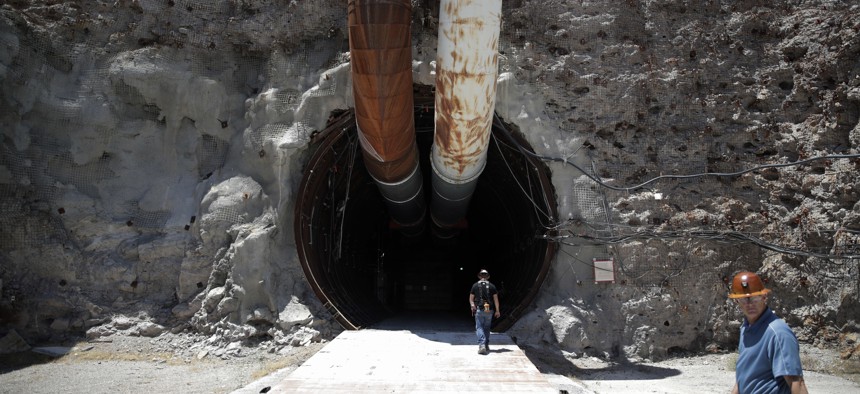Trump Says No Nuclear Waste Will Be Stored in Yucca Mountain

An entrance to the nuclear waste storage site in Yucca Mountain. AP Photo/John Locher

Connecting state and local government leaders
STATE AND LOCAL ROUNDUP | Los Angeles council passes stronger protections against hate crimes … Court could rule against Georgia governor in voter purge case … New Mexico considers a bill to protect wildlife.
President Trump, in a reversal of a previous position, said that his administration will not consider Nevada’s Yucca Mountain as a proposed storage site for commercial nuclear waste. Yucca Mountain was first approved as a nuclear waste storage site in 2002, but politicians from Nevada, who almost universally oppose the project, stalled the development until the project was abandoned in 2010.Trump had included funding to restart the Yucca Mountain project in his last three budgets, but the administration announced this week that it would not include funding for the project in its 2021 budget that was released on Monday. “Nevada, I hear you on Yucca Mountain and my Administration will RESPECT you! Congress and previous Administrations have long failed to find lasting solutions—my Administration is committed to exploring innovative approaches—I’m confident we can get it done!” Trump tweeted. Former U.S. Sen. Harry Reid, a Democrat from Nevada, has been one of the main opponents of the Yucca Mountain site for storing nuclear waste from around the country for years. “Yucca Mountain is dead and will remain dead. This has been true for a long, long time. Donald Trump finally realizing this, changing his position and trying to take credit for its demise will not change that fact. I’m glad he has finally seen the light,” said Reid. Advocates for the Yucca Mountain site say that the future is now uncertain for the 75,000 tons of nuclear fuel waste in about 60 sites around the country. Mary Love, senior media relations manager for the Nuclear Energy Institute, said that the country needs a permanent solution for that waste. "This continues to be a frustrating point for us. This is very much a political issue, not a technical issue for us," Love said. [Las Vegas Review-Journal; Tri-City Herald; Washington Examiner]
HATE CRIMES | The Los Angeles City Council last week passed stronger protections against hate crimes. The legislation instructs the Los Angeles Police Department to better protect places that may be the targets of hate crimes, like cultural centers and synagogues, and establishes a hotline for hate crime prevention. The measure was introduced by council member David Ryu after a report showed that hate crimes in the city are at the highest level since 2002. “We will not give in to fear or cynicism. We will not accept this as the new normal. We will stand together, across communities and across neighborhoods, as one of the most diverse cities on Earth and make Los Angeles a national leader in hate crime prevention,” Ryu said. According to FBI data, the worst months for hate crimes in the past ten years have been November 2016 and October 2018, the months of the presidential and midterm elections, respectively. Brian Levin, director of the Center for the Study of Hate and Extremism at Cal State San Bernardino, said that people should be alert. “I can tell you, with an election season coming up, we really have to be concerned,” Levin said. [CBS Los Angeles; Los Angeles Times]
VOTER PURGE | A federal judge has indicated she could soon rule against Georgia Gov. Brian Kemp in a lawsuit filed over allegations of a racially-biased methodology for voter purgers that happened between 2016 and 2018, when Kemp was secretary of state. According to the suit, Kemp purged as many as 700,000 legitimate voters and did not send notice of their removal to voters. The lawsuit, brought by freelance investigative journalist Greg Palast, asks the state to release the files on voter purge methodology to the public. “Kemp and the new Sec. of State of Georgia want to keep the lid on their methods for removing literally hundreds of thousands of low-income, young and minority voters on the basis of false information. They cannot hide any more. This is a huge win and precedent for reporters trying to pry information from the hands of guilty officials,” Palast said. Federal District Judge Eleanor L. Ross gave Kemp 30 days to file a brief explaining why she should not issue a final decision against him. Kemp has not yet commented publicly on the judge’s order. [11 Alive]
ENDANGERED WILDLIFE | The New Mexico state Senate passed a bill that would create penalties for buying and selling endangered wildlife. The ban would impact the trade of animal parts from elephants, lions, rhinoceros, and other endangered species that are often targets for poachers. The bill would establish a fine of up to $25,000 per object and could result in a year of jail time. The legislation makes exceptions for some antiques that are at least 100 years old and objects that are possessed by enrolled members of Native American nations. [KRQE; Associated Press]
NUISANCE LAWSUITS | A bill in Georgia seeks to limit the number of nuisance complaints that farmers face. The legislation, which has moved out of Senate committee, would create a two-year window for filing a nuisance lawsuit against a farmer from the start of the nuisance and would require the complainer to live within five miles of the farm. Farmers usually face nuisance lawsuits over smells, water contamination, and pesticide overflow. [Atlanta Journal-Constitution]
Emma Coleman is the assistant editor for Route Fifty.

NEXT STORY: A State Could Require Schools to Play the National Anthem Weekly





